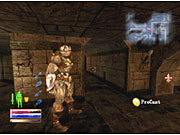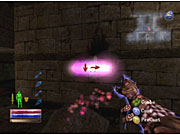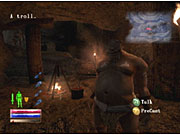Traditional console role-playing games, made in Japan and filled with random battles and melodramatic storylines, have yet to find a home on the Xbox. But the system boasts some of the best PC-style RPGs in years. Arx Fatalis is one of these, and it fully deserves a permanent place in any Xbox RPG fan's library alongside Star Wars: Knights of the Old Republic and The Elder Scrolls III: Morrowind. With Arx Fatalis, French developer Arkane Studios intended to pay homage to the classic early-'90s first-person RPG Ultima Underworld, but it has done much more than just imitate that game. Originally released a year ago for the PC, Arx Fatalis has been ported over to the Xbox nicely, and it delivers the same entertaining, good-looking, and almost incomparably atmospheric gameplay. It's highly complex and filled with much more detail than you're probably accustomed to from other games, which means Arx Fatalis isn't suitable for casual gamers. But they've never heard of Arx Fatalis, anyway, and are merely missing out on a memorable, original role-playing experience.

In Arx Fatalis, you play as a character who has lost his memory and awakens in a small cell. That's one of the most typical ways for a role-playing game to start out, but the actual setting of the game is quite a bit more interesting. Arx Fatalis takes place in a world where the sun has fizzled out and civilization has picked up and moved beneath the surface of the earth, since it's warmer down there. This means you won't be seeing much in the way of blue skies or colorful songbirds during your stay in Arx Fatalis but will instead be seeing plenty of caverns, dungeons, tunnels, and such. That might sound pretty bland, but actually it isn't. The world of Arx Fatalis may be lacking in traditional beauty or standard tourist attractions, but it's filled with detail and is highly interactive. You're able to pick up just about anything that isn't nailed down, you can use the local flora to brew various potions and such, you can move or throw things around, and if you look down, you can even see your feet. Arx Fatalis does its best to make you feel like you're actually in the world of the game, and for the most part it does an excellent job of it.
You create your character by applying ability points to four core attributes and skill points to a number of different abilities, from close combat and magic, to stealth, intuition, and object knowledge. Gaining experience levels, from vanquishing enemies and solving quests, lets you further improve these attributes and abilities. You're free to specialize as you see fit, though you'll likely want to play as a character with balanced fighting and magic abilities, since combat is inevitable and magic is essential.
Arx Fatalis is played entirely from a first-person perspective, though the game switches to an external view for its occasional in-engine cinematic cutscenes. The interface, reminiscent of that used for other first-person games such as Halo, takes a little while to get used to, but it actually works very well--Arx Fatalis ultimately is easy to control and won't be too difficult to get into. The early portions of the game also serve as a tutorial, letting you get your feet wet with the combat, magic, and puzzle-solving elements. The core gameplay and interface do have a few shortcomings. Inventory management is based on limited storage space rather than on encumbrance, and it can be clunky. Though you can toggle an onscreen automap feature, it's pretty rough and won't always help you find where you're going. The diary feature also isn't all that great, as it only vaguely serves as a quest log for what you're supposed to be doing--you'll have to pay careful attention during dialogue with the game's non-player characters to make sure you don't miss any vital clues, since they're not always likely to be noted in the diary and are not likely to be repeated.
But these are just a few relatively minor details in a game that's filled with many more interesting ones. The game lets you do such things as build fishing rods, catch fish, cook them over an open fire that you light using a magic spell, and then eat them to nourish yourself (you actually have to eat every now and then). You'll conduct fairly complex investigations, finding tiny clues such as notes hidden in drawers or keys hidden under cushions. More importantly, the game's core elements, like the combat and magic, work very well.

Dealing with enemies in Arx Fatalis is handled much like in other real-time first-person RPGs, such as Morrowind. However, the combat has a much better feel to it than in that game. You'll be able to find and use some ranged weapons, but much of the combat takes place at close range, where you'll use things like swords, clubs, and axes to execute thrusting, slashing, and chopping moves against your assailants. Depressing the right trigger causes you to wind up to strike, and charging up your attack for a few moments causes it to deal more damage. Critical hits are possible, and it's also possible to sneak up behind unsuspecting foes and launch a surprise attack. In any event, the combat in Arx Fatalis looks great, since the game's enemies animate fluidly and will respond noticeably to your attacks with shrieks of pain or various taunts. Injured enemies may turn tail and flee, and various types of deathblows yield various grisly results, depending on where and how hard the killing strike connected. While not terribly complicated, the combat in Arx Fatalis is thoroughly satisfying.
The magic system is less conventional: You cast spells using the proper hand gestures. You first need to find special runes, and you then trace the symbols on the runes in the air, in proper sequence, using the directional pad. On the PC, you actually used the mouse to draw the runes in the air; on the Xbox, the system has been simplified but still captures the hands-on feel. A successful combination of rune symbols will cast the spell. It's a good system, though it obviously takes some getting used to. The game features 50 different spells spread across 10 increasingly powerful spell levels, and these spells do everything from damaging enemies to healing your wounds to summoning creatures to turning you invisible to letting you teleport, so completely forgoing the path of magic in Arx Fatalis isn't recommendable or even possible. You might think that drawing arcane symbols might be a bit difficult in the middle of a battle, and you'd be right. Fortunately, you can queue up to five spells at a time and launch them instantly, which ensures that magic is viable in combat.

Arx Fatalis isn't exactly a linear, straightforward game. There's very little going from point A to point B; instead, you'll find yourself in sprawling labyrinths and free to go any which way, though many of these paths will lead to dead ends at first. The game's quests aren't strictly linear, either. Sometimes combat is a viable alternative to discourse, and other times, more than one nonviolent solution is available. Nevertheless, you should still plan on getting stuck in Arx Fatalis, a game in which keeping a sharp eye out for little details in the environment will constantly pay off, and failure to do so may have you running around in circles for a while. The game encourages observation, exploration, and experimentation, but at the same time it will punish you if you stray too far from the beaten path, as you'll all of a sudden come up against a foe you're not prepared to face. Still, all this is definitely in keeping with the style of classical role-playing systems such as Dungeons & Dragons, and it affords you with a stronger sense of freedom than you'll get from most other games.
Considering the game is one big dungeon crawl, it's fortunate that Arx Fatalis looks very good, overall. While the game's character models can look a little awkward, the level of detail found in its surprisingly diverse-looking environments can be quite striking. The game even presents distinctive versions of conventional fantasy archetypes like goblins, trolls, and dwarves. These are detailed enough to move their mouths when they speak, but not detailed enough to sync their lips with their words. Above all, the whole game has a natural look to it. Stone walls are bump-mapped to look real enough that you'll practically want to reach out and touch them. Arx Fatalis doesn't overuse any one particular texture set, and each room or hallway tends to look different from the next. Fog, ambient lighting, and other visual effects heighten the sense that you're underground in a cold, dark place. Realistic-looking wear and tear in the environments also really helps convey the sense that, indeed, this world has been lived in. You'll clearly see that you're not the first adventurer to set foot in Arx Fatalis. The game runs smoothly, for the most part, though the frame rate dips a bit when you're venturing through more-complex locales, such as the human city of Arx. And while Arx Fatalis may not have the conventional great looks of some other Xbox games, the overall level of detail and quality in its visuals really tends to be impressive and adds a lot to the experience.
The game sounds even better. In fact, a lot of it sounds amazing. There isn't much in the way of music, but the game uses a huge variety of incredibly clear and diverse ambient sound effects to try to convince you that you're really in an underground labyrinth. Your own footsteps will resonate loudly throughout the game, and they'll sound different depending on what sort of leggings you're wearing, what sort of surface you're walking on, how quickly you're moving, and how stealthy you are. Other ambient effects and almost all the game's creatures sound equally convincing, and the clamor of battle--including such effects as the sickening sound of blood splattering onto the pavement--is especially terrific. The dialogue in Arx Fatalis is all in full speech, and this too is surprisingly good for the most part. Some of the dialogue and some of the deliveries are actually quite subtle and rather humorous, and they stand in stark contrast to the game's seemingly dismal setting.

The original PC version of Arx Fatalis shipped with a number of bugs, most of which were addressed by downloadable patches, and this Xbox version also fixes a handful of problems. Nevertheless, some technical issues still undermine the game to some extent. Most noticeably, the loading times when saving your progress or when loading a saved game can be uncomfortably lengthy. Also, the open-ended nature of Arx Fatalis means that if you go out of your way to not play by the rules, you may find yourself in a bind. Like other PC-style RPGs, Arx Fatalis is best suited for patient gamers, most of whom will be more than happy to trade off the occasionally frustrating moment for the freedom to go through the game whichever way they choose.
If you don't have any hang-ups with wandering around in dark places, and you're looking for a deep and involving role-playing game, then you'd be doing yourself a favor by checking out Arx Fatalis. This is a game you can really lose yourself in. At times, it'll make you feel as though you yourself are trapped in this fantastic world, filled with interesting, dangerous places to visit and characters to meet.